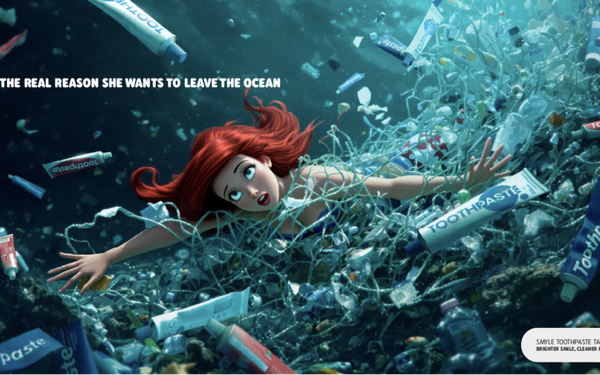
Maybe it’s something in
the water, but oral care brands overseas continue to roll out impressive ad campaigns.
Last week, it was Colgate India showing how overused toothbrushes look like blooming flowers.
Now,
European brand Smyle -- in an awareness campaign focused on water -- is boasting how its use of toothpaste tablets instead of toothpaste tubes has saved some 10 million plastic packages and
microplastics from entering the ocean since its launch in 2020.
And it’s calling on other toothpaste manufacturers -- Procter & Gamble (Crest), Haleon (Sensodyne) and Unilever
(Close-Up) are named specifically, but not Colgate -- to give up plastics in their products.
advertisement
advertisement
Reinforcing the water/ocean theme in its new campaign, Smyle has enlisted characters who
look a lot like Disney’s Moana and Ariel for billboards, social media and
videos.
As toothpaste tubes wash up on shore, the Moana-looking character is in a rowboat gazing out to sea. “No wonder the ocean is calling her,” declares the ad.
Showing
the Ariel-looking character swimming through a mess of toothpaste tubes, another ad proclaims, “The Real Reason She Wants to Leave the Ocean.”
A third ad shows water cluttered with toothpaste tubes and the line, “Finding Nemo Gets Harder Every Day.”
Asked if use of the three
characters had been licensed from Disney, Mischa Schreuder, executive creative director at Dutch ad agency Fitzroy, tells Marketing Daily “We referenced three sea icons people could
recognize. These iconic characters- the sea mermaid who is a gorgeous woman with red hair, or the girl standing on the boat – were thoughtfully included without mention of their names in the
ads.”
The campaign, which began April 8 and runs for six weeks, includes paid and organic social, plus billboards in Rotterdam, Amsterdam and other Dutch locations.
“Who wants to brush their teeth with plastic?” Smyle founder Almar Fernhout said in a statement. “Each year, 11 million tons of plastic end up in the oceans. A large portion of
that comes from single-use packaging. Completely unnecessary, because plastic-free choices are not hard to make. And this campaign makes it instantly clear that making the switch is
essential.”